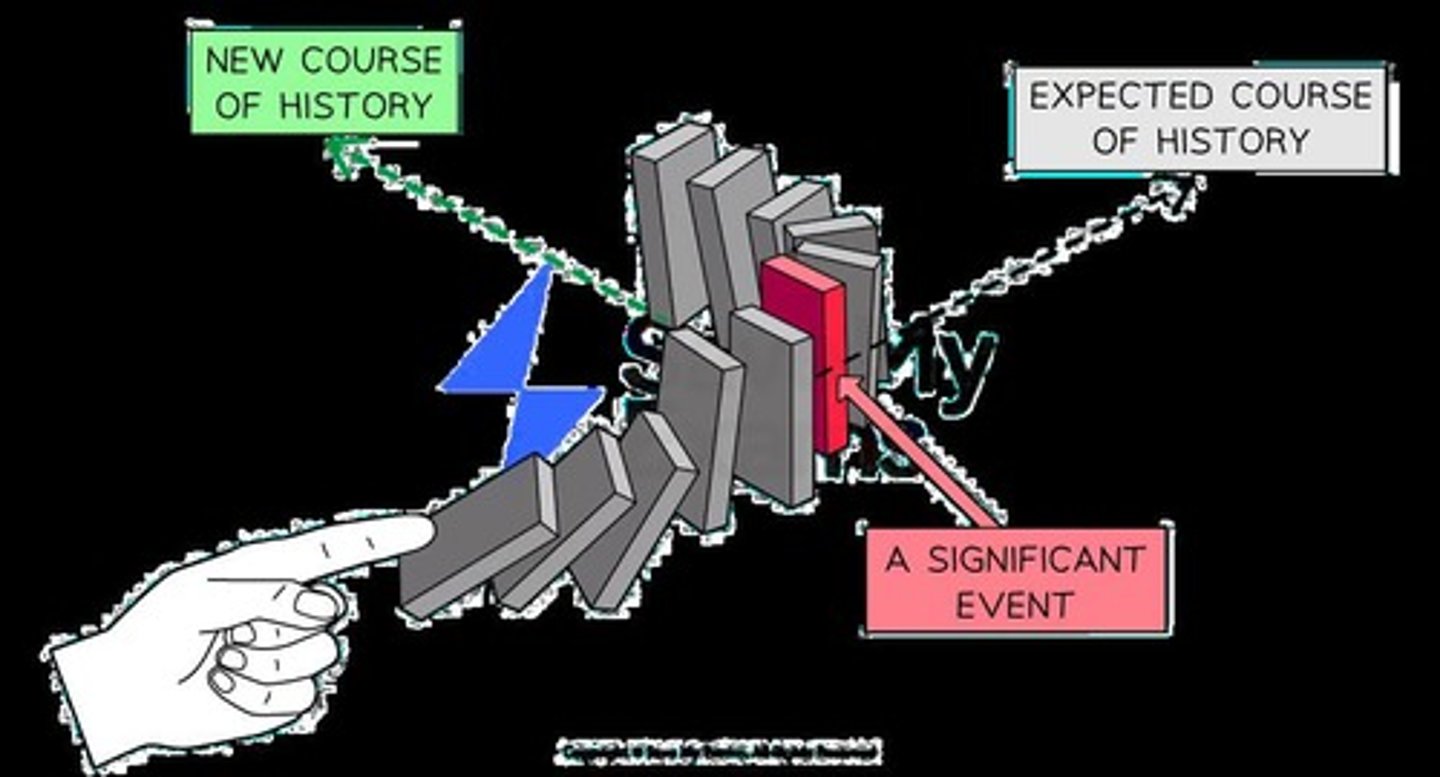AQA GCSE History: Health & the People Exam Skills
1/202
There's no tags or description
Looks like no tags are added yet.
Name | Mastery | Learn | Test | Matching | Spaced |
|---|
No study sessions yet.
203 Terms
8 Mark Question Types
Different question formats for Health & the People.
How Useful Question
Evaluate a source's usefulness for historical issues.
Explain Significance Question
Discuss the importance of historical events or figures.
Two Ways Similar Question
Compare similarities between two historical elements.
Factors Question
Analyze various factors influencing historical developments.
Source Provenance
Background information about a historical source.
Source Content
Information presented within a historical source.
Judgement in Questions
Assess the usefulness or significance decisively.
Common Mistakes
Frequent errors in answering historical evaluation questions.
Public Health (2018)
Exam question focused on 19th-century public health.
Treatment Methods (2019)
Exam question on 18th-19th century disease treatments.
Surgery (2020)
Exam question regarding late 18th-early 19th century surgery.
NHS (2021)
Exam question about the National Health Service's history.
Modern Treatment (2022)
Exam question on contemporary disease treatment methods.
Source Analysis
Examine both content and provenance for insights.
First-hand Information
Direct insights gained from a source's provenance.
Source Types
Different formats like letters, speeches, and cartoons.
Antibiotic Resistance
Issue highlighted in a source about modern health.
MRSA
A disease related to antibiotic resistance concerns.
Decisive Language
Use clear terms to express judgments effectively.
Source Evaluation
Assessing a source's relevance to historical questions.
Historical Context
Understanding the background surrounding a historical source.
Source Analysis Techniques
Methods for analyzing content and provenance effectively.
Judgement of Sources
Assessment of a source's reliability and usefulness.
Unreliable Sources
Sources that may contain biased or inaccurate information.
Provenance
Origin and history of a source's creation.
Content Analysis
Examination of specific information within a source.
Historical Context
Knowledge of the time period relevant to the source.
Source Strengths
Positive aspects that enhance a source's usefulness.
Limitations in Responses
Acknowledgment of a source's weaknesses in analysis.
How Useful Questions
Questions assessing a source's relevance to a topic.
PEE Paragraphs
Structure for responses: Point, Evidence, Explanation.
Inference
Conclusion drawn from the source's information.
World Health Organisation
UN agency focused on global public health.
Antibiotic Resistance
Bacterial ability to withstand antibiotic treatment.
Example Source
Specific source used for historical analysis.
Insert Booklet
Supplementary material providing key sources for exams.
Full Marks Criteria
Requirements to achieve maximum points in assessments.
Modern Treatment Issues
Contemporary challenges in healthcare practices.
Bias
Prejudice in a source affecting its reliability.
Historical Interpretation
Analysis of past events based on sources.
Source Utility
Value of a source in understanding historical issues.
Specific Knowledge
Detailed understanding relevant to the source's topic.
Focus on Question
Directly addressing the question's requirements in analysis.
Campaign for Awareness
Efforts to inform the public on health issues.
MRSA
Methicillin-resistant Staphylococcus aureus, a resistant infection.
Antibiotic Resistance
Inability of bacteria to be killed by antibiotics.
WHO
World Health Organization, a UN health agency.
Global Health Campaign
Initiative to raise awareness on health issues worldwide.
Overusing Antibiotics
Excessive use leading to resistance and health risks.
Significance in History
Importance of events or people over time.
Second-order Concepts
Framework for analyzing historical significance.
Hindsight
Understanding events with knowledge of future outcomes.
Historical Significance
Importance of events evaluated by historians.
Domino Effect
One event causes a series of subsequent events.

Subjective Interpretation
Personal opinions influencing historical significance assessments.
Debatable Importance
Different conclusions about significance based on evidence.
Modern Treatments
Current medical practices addressing health issues.
Health Awareness
Public knowledge about health risks and prevention.
International Collaboration
Countries working together on global health issues.
Antibiotic Use in 21st Century
Current practices and challenges in antibiotic prescriptions.
Key Health Issues
Major health concerns impacting global populations.
Impact on Society
Effects of health developments on communities.
Historical Events
Significant occurrences shaping the course of history.
Long-term Impacts
Enduring effects of historical events on society.
Example of Significance
James Simpson's contribution to modern anaesthetics.
Time Allocation for Questions
Recommended 10 minutes for answering significance questions.
Health and the People
Study of historical developments in health practices.
Explain the Significance of
A question type assessing historical impact.
James Simpson
Pioneer in developing anaesthetics, notably chloroform.
Chloroform
Effective anaesthetic discovered by Simpson in 1847.
Medical practices
Methods of treatment used in various societies.
Role of religion
Influence of religious beliefs on medical practices.
Joseph Lister
Introduced antiseptic techniques in surgery.
Royal Society
Institution promoting scientific advancement in Britain.
Antibiotics
Medicines used to treat bacterial infections.
Significance changes
Impact of events can evolve over time.
Background influence
Personal experiences shape perceptions of significance.
PEE paragraphs
Structure for constructing coherent historical arguments.
Point (P)
Main argument or claim in a PEE paragraph.
Evidence (E)
Supporting knowledge for the point made.
Explanation (E)
Clarification of the significance of the evidence.
Queen Victoria
Her use of chloroform increased public acceptance.
Opposition reduction
Decreased resistance to anaesthetics after royal endorsement.
Historical context
Background information relevant to a historical event.
Complex explanations
Detailed reasoning showing deeper understanding of significance.
Impact on time period
How events or individuals shaped historical developments.
Specific relevant knowledge
Detailed facts pertinent to the question asked.
Past Papers
Previous exam questions for practice and revision.
Save My Exams
Resource website for exam preparation materials.
Health & the People
Course covering medical history from c1000 to present.
8 Mark Question
Requires two similarities between two subjects.
Common Theme
A connecting factor for the subjects discussed.
Time Limit
Spend no more than 10 minutes answering.
2018 Example
Renaissance surgery vs 19th century surgery.
2019 Example
Louis Pasteur's work vs Alexander Fleming's work.
2020 Example
Medieval hospitals vs 18th century hospitals.
2021 Example
Medieval public health vs 19th century public health.
2022 Example
Work of Paré vs work of Lister.
Sample Comparison 1
Black Death vs 19th century cholera epidemics.
